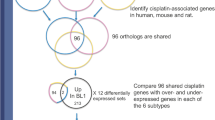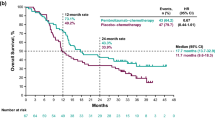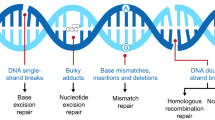Summary
Purpose. Docetaxel, cisplatin, and 5-fluorouracil (DCF) have high response rates, but severe neutropenia is frequently observed. The occurrence of neutropenia is associated with high histological response in solid tumors, and it might be associated with tumor shrinkage after DCF therapy. This study aimed to determine the genetic polymorphisms involved in the clinical response to preoperative DCF therapy in esophageal cancer patients. Methods. We included 56 patients with measurable lesions who received preoperative DCF therapy for esophageal cancer. Twenty-one genetic polymorphisms were analyzed, and univariate logistic regression analysis was used to evaluate the association between genetic polymorphisms and tumor shrinkage. A multivariate logistic regression analysis adjusted for T category and tumor location and a univariate analysis for potential genetic factors with P values < 0.05 were performed to explore the predictive factors and to estimate odds ratios and their 95% confidence intervals. Results. No patient achieved a complete response, whereas 20 patients achieved a partial response, 31 patients had stable disease, and 5 patients had progressive disease. Although no association was found between pharmacokinetic-related gene polymorphisms, XRCC3 rs17997944 was extracted as the only genetic factor that affected tumor shrinkage (P = 0.033) by univariate analysis. The multivariate analysis adjusted for T category and tumor site also showed that XRCC3 rs1799794: AA was a predictive factor that affected tumor shrinkage (odds ratio, 0.243; 95% confidence interval, 0.065–0.914; P = 0.036). Conlusions. XRCC3 rs1799794, which is involved in homologous recombination, is a genetic factor that affects clinical responses to DCF therapy.

Similar content being viewed by others
Data availability
The datasets during and analyzed during the current study available from the corresponding author on reasonable request.
References
Siegel RL, Miller KD (2019) Jemal A (2019) Cancer statistics. CA Cancer J Clin 69(1):7–34. https://doi.org/10.3322/caac.21551
Sjoquist KM, Burmeister BH, Smithers BM, Zalcberg JR, Simes RJ, Barbour A, Gebski V, Australasian Gastro-Intestinal Trials G (2011) Survival after neoadjuvant chemotherapy or chemoradiotherapy for resectable oesophageal carcinoma: an updated meta-analysis. Lancet Oncol 12(7):681–692. https://doi.org/10.1016/S1470-2045(11)70142-5
Kidane B, Coughlin S, Vogt K, Malthaner R (2015) Preoperative chemotherapy for resectable thoracic esophageal cancer. Cochrane Database Syst Rev (5):CD001556. https://doi.org/10.1002/14651858.CD001556.pub3
Gebski V, Burmeister B, Smithers BM, Foo K, Zalcberg J, Simes J, Australasian Gastro-Intestinal Trials G (2007) Survival benefits from neoadjuvant chemoradiotherapy or chemotherapy in oesophageal carcinoma: a meta-analysis. Lancet Oncol 8(3):226–234. https://doi.org/10.1016/S1470-2045(07)70039-6
Ando N, Kato H, Igaki H, Shinoda M, Ozawa S, Shimizu H, Nakamura T, Yabusaki H, Aoyama N, Kurita A, Ikeda K, Kanda T, Tsujinaka T, Nakamura K, Fukuda H (2012) A randomized trial comparing postoperative adjuvant chemotherapy with cisplatin and 5-fluorouracil versus preoperative chemotherapy for localized advanced squamous cell carcinoma of the thoracic esophagus (JCOG9907). Ann Surg Oncol 19(1):68–74. https://doi.org/10.1245/s10434-011-2049-9
Hara H, Tahara M, Daiko H, Kato K, Igaki H, Kadowaki S, Tanaka Y, Hamamoto Y, Matsushita H, Nagase M, Hosoya Y (2013) Phase II feasibility study of preoperative chemotherapy with docetaxel, cisplatin, and fluorouracil for esophageal squamous cell carcinoma. Cancer Sci 104(11):1455–1460. https://doi.org/10.1111/cas.12274
Nakamura K, Kato K, Igaki H, Ito Y, Mizusawa J, Ando N, Udagawa H, Tsubosa Y, Daiko H, Hironaka S, Fukuda H, Kitagawa Y, Japan Esophageal Oncology Group/Japan Clinical Oncology G (2013) Three-arm phase III trial comparing cisplatin plus 5-FU (CF) versus docetaxel, cisplatin plus 5-FU (DCF) versus radiotherapy with CF (CF-RT) as preoperative therapy for locally advanced esophageal cancer (JCOG1109, NExT study). Jpn J Clin Oncol 43(7):752–755. https://doi.org/10.1093/jjco/hyt061
Di Maio M, Gridelli C, Gallo C, Shepherd F, Piantedosi FV, Cigolari S, Manzione L, Illiano A, Barbera S, Robbiati SF, Frontini L, Piazza E, Ianniello GP, Veltri E, Castiglione F, Rosetti F, Gebbia V, Seymour L, Chiodini P, Perrone F (2005) Chemotherapy-induced neutropenia and treatment efficacy in advanced non-small-cell lung cancer: a pooled analysis of three randomised trials. Lancet Oncol 6(9):669–677. https://doi.org/10.1016/S1470-2045(05)70255-2
Saarto T, Blomqvist C, Rissanen P, Auvinen A, Elomaa I (1997) Haematological toxicity: a marker of adjuvant chemotherapy efficacy in stage II and III breast cancer. Br J Cancer 75(2):301–305. https://doi.org/10.1038/bjc.1997.49
Cameron DA, Massie C, Kerr G, Leonard RC (2003) Moderate neutropenia with adjuvant CMF confers improved survival in early breast cancer. Br J Cancer 89(10):1837–1842. https://doi.org/10.1038/sj.bjc.6601366
Schuell B, Gruenberger T, Kornek GV, Dworan N, Depisch D, Lang F, Schneeweiss B, Scheithauer W (2005) Side effects during chemotherapy predict tumour response in advanced colorectal cancer. Br J Cancer 93(7):744–748. https://doi.org/10.1038/sj.bjc.6602783
Yamanaka T, Matsumoto S, Teramukai S, Ishiwata R, Nagai Y, Fukushima M (2007) Predictive value of chemotherapy-induced neutropenia for the efficacy of oral fluoropyrimidine S-1 in advanced gastric carcinoma. Br J Cancer 97(1):37–42. https://doi.org/10.1038/sj.bjc.6603831
Otake A, Tsuji D, Taku K, Kawasaki Y, Yokoi M, Nakamori H, Osada M, Matsumoto M, Inoue K, Hirai K, Itoh K (2017) Chemotherapy-induced neutropenia as a prognostic factor in patients with metastatic pancreatic cancer treated with gemcitabine. Eur J Clin Pharmacol 73(8):1033–1039. https://doi.org/10.1007/s00228-017-2260-0
Yamamoto K, Sasano T, Tsuji D, Ishizuka Y, Tokou U, Nakamichi H, Yoneda T, Shiokawa M, Yabe K (2019) Effects of Chemotherapy-Induced Neutropenia on Overall Survival in Patients With Unresectable or Metastatic Urothelial Carcinoma to Gemcitabine Plus Cisplatin Combination Chemotherapy. Ann Pharmacother 53(7):690–696. https://doi.org/10.1177/1060028019830785
Konishi H, Fujiwara H, Shiozaki A, Hiramoto H, Kosuga T, Komatsu S, Ichikawa D, Okamoto K, Otsuji E (2016) Effects of neutropenia and histological responses in esophageal squamous cell carcinoma with neo-adjuvant chemotherapy. Int J Clin Oncol 21(1):95–101. https://doi.org/10.1007/s10147-015-0875-7
Nomura H, Tsuji D, Demachi K, Mochizuki N, Matsuzawa H, Yano T, Daiko H, Fujii S, Kojima T, Itoh K, Kawasaki T (2020) ABCB1 and ABCC2 genetic polymorphism as risk factors for neutropenia in esophageal cancer patients treated with docetaxel, cisplatin, and 5-fluorouracil chemotherapy. Cancer Chemother Pharmacol 86(2):315–324. https://doi.org/10.1007/s00280-020-04118-9
Martin LP, Hamilton TC, Schilder RJ (2008) Platinum resistance: the role of DNA repair pathways. Clin Cancer Res 14(5):1291–1295. https://doi.org/10.1158/1078-0432.CCR-07-2238
Yang Y, Xian L (2014) The association between the ERCC1/2 polymorphisms and the clinical outcomes of the platinum-based chemotherapy in non-small cell lung cancer (NSCLC): a systematic review and meta-analysis. Tumour Biol 35(4):2905–2921. https://doi.org/10.1007/s13277-013-1493-5
Eisenhauer EA, Therasse P, Bogaerts J, Schwartz LH, Sargent D, Ford R, Dancey J, Arbuck S, Gwyther S, Mooney M, Rubinstein L, Shankar L, Dodd L, Kaplan R, Lacombe D, Verweij J (2009) New response evaluation criteria in solid tumours: revised RECIST guideline (version 1.1). Eur J Cancer 45 (2):228–247. https://doi.org/10.1016/j.ejca.2008.10.026
Zhao Z, Zhang Y, Wang X, Geng X, Zhu L, Li M (2020) Clinical response to chemoradiotherapy in esophageal carcinoma is associated with survival and benefit of consolidation chemotherapy. Cancer Med 9(16):5881–5888. https://doi.org/10.1002/cam4.3273
Nomura H, Hatogai K, Maki Y, Mochizuki N, Tanaka M, Saito S, Daiko H, Kojima T, Kawasaki T (2020) Risk factors for febrile neutropenia in neoadjuvant docetaxel, cisplatin, and 5-fluorouracil chemotherapy for esophageal cancer. Support Care Cancer 28(4):1849–1854. https://doi.org/10.1007/s00520-019-05001-x
Yano R, Konno A, Watanabe K, Tsukamoto H, Kayano Y, Ohnaka H, Goto N, Nakamura T, Masada M (2013) Pharmacoethnicity of docetaxel-induced severe neutropenia: integrated analysis of published phase II and III trials. Int J Clin Oncol 18(1):96–104. https://doi.org/10.1007/s10147-011-0349-5
Cheng J, Liu W, Zeng X, Zhang B, Guo Y, Qiu M, Jiang C, Wang H, Wu Z, Meng M, Zhuang H, Zhao L, Hao J, Cai Q, Xie D, Pang Q, Wang P, Yuan Z, Qian D (2015) XRCC3 is a promising target to improve the radiotherapy effect of esophageal squamous cell carcinoma. Cancer Sci 106(12):1678–1686. https://doi.org/10.1111/cas.12820
de las Penas R, Sanchez-Ronco M, Alberola V, Taron M, Camps C, Garcia-Carbonero R, Massuti B, Queralt C, Botia M, Garcia-Gomez R, Isla D, Cobo M, Santarpia M, Cecere F, Mendez P, Sanchez JJ, Rosell R, Spanish Lung Cancer G, (2006) Polymorphisms in DNA repair genes modulate survival in cisplatin/gemcitabine-treated non-small-cell lung cancer patients. Ann Oncol 17(4):668–675. https://doi.org/10.1093/annonc/mdj135
Assis J, Pereira D, Medeiros R (2013) Ovarian cancer and DNA repair: DNA ligase IV as a potential key. World J Clin Oncol 4(1):14–24. https://doi.org/10.5306/wjco.v4.i1.14
Xu ZY, Loignon M, Han FY, Panasci L, Aloyz R (2005) Xrcc3 induces cisplatin resistance by stimulation of Rad51-related recombinational repair, S-phase checkpoint activation, and reduced apoptosis. J Pharmacol Exp Ther 314(2):495–505. https://doi.org/10.1124/jpet.105.084053
Maacke H, Jost K, Opitz S, Miska S, Yuan Y, Hasselbach L, Luttges J, Kalthoff H, Sturzbecher HW (2000) DNA repair and recombination factor Rad51 is over-expressed in human pancreatic adenocarcinoma. Oncogene 19(23):2791–2795. https://doi.org/10.1038/sj.onc.1203578
Fachal L, Gomez-Caamano A, Peleteiro P, Carballo A, Calvo-Crespo P, Sanchez-Garcia M, Lobato-Busto R, Carracedo A, Vega A (2012) Association of a XRCC3 polymorphism and rectum mean dose with the risk of acute radio-induced gastrointestinal toxicity in prostate cancer patients. Radiother Oncol 105(3):321–328. https://doi.org/10.1016/j.radonc.2012.09.013
Burri RJ, Stock RG, Cesaretti JA, Atencio DP, Peters S, Peters CA, Fan G, Stone NN, Ostrer H, Rosenstein BS (2008) Association of single nucleotide polymorphisms in SOD2, XRCC1 and XRCC3 with susceptibility for the development of adverse effects resulting from radiotherapy for prostate cancer. Radiat Res 170(1):49–59. https://doi.org/10.1667/RR1219.1
Pasqualetti F, Gonnelli A, Orlandi P, Palladino E, Giannini N, Gadducci G, Mattioni R, Montrone S, Calistri E, Mazzanti CM, Franceschi S, Ortenzi V, Scatena C, Zavaglia K, Fanelli GN, Morganti R, Santonocito O, Bocci G, Naccarato GA, Paiar F (2021) Association of XRCC3 rs1799794 polymorphism with survival of glioblastoma multiforme patients treated with combined radio-chemotherapy. Invest New Drugs 39(4):1159–1165. https://doi.org/10.1007/s10637-021-01075-9
Salnikova LE, Kolobkov DS (2016) Germline and somatic genetic predictors of pathological response in neoadjuvant settings of rectal and esophageal cancers: systematic review and meta-analysis. Pharmacogenomics J 16(3):249–265. https://doi.org/10.1038/tpj.2015.46
Author information
Authors and Affiliations
Contributions
Conception and design were performed by HN, DT, TaKo, HD, and SF. Acquisition of data was carried out by HN, KD, HD, and TaKo. The analysis of SNPs were DT, SU, and KI. Statistical analysis and interpretation of the data were carried out by DT and SU. Drafting of the article was carried out by NH, DT, TaKo, ToKa, and SF. All authors read and approved the final manuscript.
Corresponding author
Ethics declarations
Ethics approval and consent to participate
The study protocol was approved by the institutional review board of the NCC, Japan in March 2017 (2016–384). These patients were consented to be used the clinical information and DNA sample in the National Cancer Center (NCC) Biobank Registry. The study design is displayed on the website for the National Cancer Center Hospital East, providing the relatives of deceased patients the opportunity to decline participation in the current study.
Consent for publication
All authors agree to publish.
Research involving Human Participants and/or Animals
All procedures performed in studies involving human participants were in accordance with the ethical standards of the institutional and/or national research committee and with the 1964 Helsinki declaration and its later amendments or comparable ethical standards.
Informed consent
All patients provided their written informed consent to allow the use of their clinical information and DNA samples, which are available in the NCC Biobank Registry.
Disclosure of potential conflicts of interest
Takashi Kojima received honoraria from Ono and MSD and research funding from Ono, MSD, Taiho, Chugai, Shionogi and Palexel. Tomoaki Yano received honoraria from Olympus, Meijiseika pharma and research funding from Olympus, Fujifirm, HOYA PENTAX, Rakuten Medical, SHIMADZU and Tokyo Giken. All other authors declare no potential conflicts of interest.
Additional information
Publisher's Note
Springer Nature remains neutral with regard to jurisdictional claims in published maps and institutional affiliations.
Rights and permissions
About this article
Cite this article
Nomura, H., Tsuji, D., Ueno, S. et al. Relevance of pharmacogenetic polymorphisms with response to docetaxel, cisplatin, and 5-fluorouracil chemotherapy in esophageal cancer. Invest New Drugs 40, 420–429 (2022). https://doi.org/10.1007/s10637-021-01199-y
Received:
Accepted:
Published:
Issue Date:
DOI: https://doi.org/10.1007/s10637-021-01199-y




